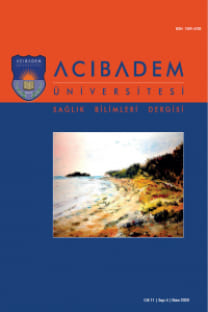EVLİ YETİŞKİNLERİN AİLE İÇİ ŞİDDETE YÖNELİK TUTUMU: TÜRKİYE DENEYİMİ
Married Adult's Attitude Towards Domestic Violence: Turkish Experience
Domestic violence, victim blaming attitude, married adult,
___
Semahegn A, Belachew T, Abdulahi M. Domestic violence and its predictors among married women in reproductive age in Fagitalekoma Woreda, Awi zone, Amhara regional state, North Western Ethiopia. Reprod Health 2013;10:63.Craparo G, Gori A, Petruccelli I, Cannella V, Simonelli C. Intimate Partner Violence: Relationships Between Alexithymia, Depression, Attachment Styles, and Coping Strategies of Battered Women. J Sex Med 2014;11:1484-1494.
Savas N, Agridag G. The relationship between women’s mental health and domestic violence in semirural areas: a study in Turkey. Asia Pac J Public Health 2011;23:399-407.
Mayda AS, Akkus D. Domestic violence against 116 Turkish housewives: a field study. Women Health 2004;40:95-108.
Kocacik F, Dogan O. Domestic violence against women in Sivas, Turkey: survey study. Croat Med J 2006;47:742-749.
Ergin N, Bayram N, Alper Z, Selimoglu K, Bilgel N. Domestic violence: a tragedy behind the doors. Women Health 2005;42:35-51.
Rani M, Bonu S. Attitudes toward wife beating: a cross-country study in Asia. J Interpers Violence 2009;24:1371-1397.
Uthman OA, Lawoko S, Moradi T. Factors associated with attitudes towards intimate partner violence against women: a comparative analysis of 17 sub-Saharan countries. BMC Int Health Hum Rights 2009;9:14.
Hıdıroglu S, Topuzoglu A, Ay P, Karavus M. The assessment of the factors influencing physical violence against women and children: a primary health care center based study in Istanbul. Yeni Symposium 2006;44:196-202.
Jewkes R. Intimate partner violence: causes and prevention. Lancet 2002;359:1423-1429.
Rani M, Bonu S, Diop-Sidibe N. An empirical investigation of attitudes towards wife-beating among men and women in seven sub-Saharan African countries. Afr J Reprod Health 2004;8:116-136.
Babu BV, Kar SK. Domestic violence against women in eastern India: a population-based study on prevalence and related issues. BMC Public Health 2009;9:129.
Hamzeh B, Farshi MG, Laflamme L. Opinions of married women about potential causes and triggers of intimate partner violence against women. A cross-sectional investigation in an Iranian city. BMC Public Health 2008;8:209.
Hamzeh B, Garousi Farshi M, Laflamme L. Opinions about potential causes and triggers of intimate partner violence against women: a population-based study among married men from Kermanshah city, Iran. Int J Inj Contr Saf Promot 2008;15:253-263.
Aksan HA, Aksu F. The training needs of Turkish emergency department personnel regarding intimate partner violence. BMC Public Health 2007;7:350.
Douki S, Nacef F, Belhadj A, Bouasker A, Ghachem R. Violence against women in Arab and Islamic countries. Arch Womens Ment Health 2003;6:165-171.
- ISSN: 1309-470X
- Yayın Aralığı: 4
- Başlangıç: 2010
- Yayıncı: ACIBADEM MEHMET ALİ AYDINLAR ÜNİVERSİTESİ
Solunum Sıkıntısına Eşlik Eden Ekimoz Alanı
Mahmut Alp KARAHAN, Tekin BİLGİÇ, Evren BÜYÜKFIRAT, Ahmet KÜÇÜK, Şaban YALÇIN
Mediyastinal ve Servikal Lenf Bezi Tutulumu ile Başvuran İlginç Bir Silikozis Olgusu
Oya Nermin SİVRİKOZ, Aynur SOLAK, Seyhan YALAZ, Fidan SEVER
ERİŞKİN BİR HASTADA İLEAL LİPOMA BAĞLI İLEOÇEKAL İNTUSSUSEPSİYON
Bülent YAŞAR, Ömer AVLANMIŞ, Yasin AĞIRMAK
Hemşirelik Modellerinden: Roy Adaptasyon Modeli
Ayşe KACAROĞLU VİCDAN, Bilgi Gülseven KARABACAK
Uterus Didelfis Olgusunda Term Gebelik
Orkun ÇETİN, Fatma Ferda VERİT, Ali Galip ZEBİTAY, İpek Dokurel ÇETİN, Şebnem Kuter YILANCIOĞLU, Seda KESKİN, Oğuz YÜCEL
Brakiyal Pleksusdan Gelişen Schwannoma: Olgu Sunumu
Serkan YILMAZ, M. Furkan SÖKMEN, Cem ÖZER, E. Tuba CANPOLAT
SPİNAL EPİDURAL APSEYİ DÜŞÜNDÜREN SERVİKAL DİSK HERNİSİ
İbrahim SUN, Burcu KASAPOĞLU, Ali GENÇ, Serdar ÖZGEN, Necmettin PAMİR
Answer to “What is Your Diagnosis?” on p. 281
Sermin TOK, Çiğdem DEVİR, Ertunç ALTUNTAŞ, İlknur IŞIK
EVLİ YETİŞKİNLERİN AİLE İÇİ ŞİDDETE YÖNELİK TUTUMU: TÜRKİYE DENEYİMİ
